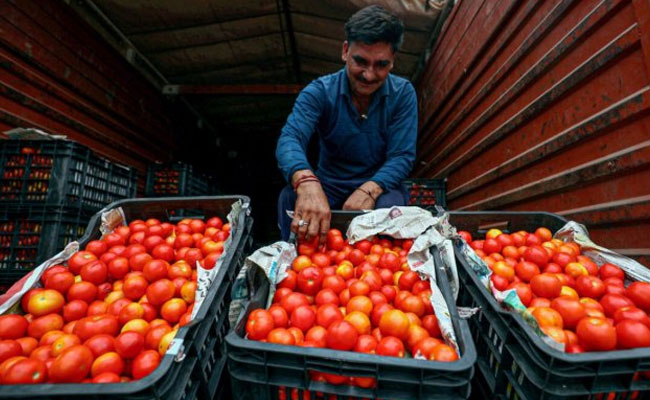New Delhi (PTI): The government on Friday said retail prices of tomatoes are expected to fall with higher supply of new crops from Maharashtra and Madhya Pradesh.
The retail prices have shot up to Rs 200-250 per kilogram in several parts of the country as supply chain got disrupted due to monsoon rains and other issues.
In a written reply to Rajya Sabha, Minister of State for Consumer Affairs, Food and Public Distribution Ashwini Kumar Choubey said, "Prices of tomato are expected to come down with the increase in arrival of new crop from Nashik, Naryangaon and Aurangabad belt in Maharashtra and also from Madhya Pradesh."
He said the "current increase in tomato prices may incentivize farmers to grow more tomato crop which is expected to stabilize the prices in coming months".
Choubey attributed the recent increase in prices to a combination of factors like "crop seasonality, white fly disease in Kolar (Karnataka), instantaneous arrival of monsoon rains in northern part of the country which adversely affected tomato crops in Haryana and Himachal Pradesh and logistics disruptions in isolated areas due to heavy rains."
The minister informed that the average daily retail price of tomato had crossed Rs 150 per kg in Delhi, Punjab, Chandigarh and Andaman and Nicobar Islands during the week July 10-16.
As on July 18, the average retail price in Delhi declined to Rs 130 per kg and to Rs 127.70 per kg in Punjab.
In order to check prices of tomatoes and make them affordable, the government has started their procurement under Price Stabilisation Fund and is making them available at a highly subsidised rate to consumers.
The National Cooperative Consumers Federation (NCCF) and National Agricultural Cooperative Marketing Federation (NAFED) are continuously procuring tomatoes from 'mandis' in Andhra Pradesh, Karnataka and Maharashtra and making them available at affordable prices in major consuming centres in Delhi-NCR, Bihar, Rajasthan, etc.
Tomatoes have been disposed initially at retail price of Rs 90 per kg which has been reduced to Rs 80 per kg from July 16 and further to Rs 70 per kg from July 20.
Till July 18, a total of 391 tonne tomatoes had been procured for continuous retail disposal in major consumption centres for the benefit of consumers.
Let the Truth be known. If you read VB and like VB, please be a VB Supporter and Help us deliver the Truth to one and all.
Bhubaneswar/Berhampur/Phulbani, Nov 1: At least two tribal women died and six others fell ill after allegedly consuming mango kernel gruel in Odisha's Kandhamal district, police said on Friday.
Consumption of mango kernel, prepared by boiling the seeds in water, was reported from Mandipanka village in the district's Daringbadi block, an officer said.
While one of the two women (Rasmita Pattamajhi aged 22) died on Thursday night at Mohana community health centre in Gajapati district where she was undergoing treatment after "consuming the gruel", another woman (Runu Majhi aged 29) breathed her last while being taken to MKCG Medical College Hospital in Berhampur, Gadapur sarpanch Kumari Mallick said.
Six others, who fell ill after allegedly consuming the gruel, were admitted to a hospital and their condition was critical, said Dr Subrat Das, a medical officer of the health facility.
"All the six have been admitted to the hospital in a serious condition. We suspected that they fell sick due to food poisoning. The exact cause of the illness will be ascertained after completion of the investigation," he added.
The six were identified as Pravati Patmajhi, Dranglu Patmajhi, Tuni Majhi, Susama Patmajhi, Jita Majhi and Jibanti Majhi, Daringbadi BDO Pritiranjan Ratha said.
Meanwhile, the Odisha government has rejected allegations that tribal people have been consuming mango kernel gruel due to a lack of access to rice under the Public Distribution System (PDS).
Rasmita's husband Anil Pattamajhi alleged that they were denied rice under PDS for the last three months because of which his wife consumed mango kernel.
However, Kandhamal district magistrate-cum-collector Amrit Ruturaj dismissed the allegations, saying the family received rice according to PDS norms. "We are awaiting the postmortem report to determine the facts," the collector added.
Deputy chief minister Pravati Parida, who is also in-charge of the women and child development department said, "It is not a case of malnutrition. Mango kernel is part of their (tribal) regular diet. Sometime, the mango kernels get contaminated and lead to such unfortunate incidents. We have been actively spreading awareness about the risks of food contamination."
Health and family welfare minister Mukesh Mahaling, who ordered a departmental inquiry into the death of two tribal women, said a team from the district headquarters hospital and another local team are at the spot to assess the situation and conduct a detailed probe into the incident.
Mahaling said that the government was waiting for the postmortem report for a confirmation on the cause of the deaths. "People in Kandhamal consume mango kernel. It is common in that region and there also have been reports of health complications linked to it in the past," he said.
The Kandhmal incident reminds a similar tragedy involving mango kernel deaths in Kashipur block of Rayagada district, where at least 20 people died in 2001, and two more succumbed to mango kernel consumption in 2016. Additionally, mango kernel has claimed lives in Laxmipur in Koraput district in 2012 and 2013, as well as in Jharigaon in Nabarangpur district in 2018.





